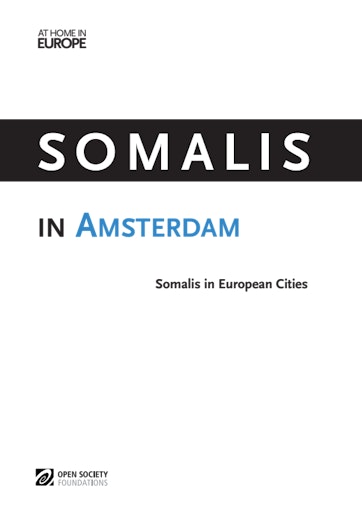Somalis in Amsterdam face more challenges than any other refugee community in the city and need specific strategies and programs to tackle these challenges according to research launched today.
Somalis in Amsterdam, a report by the Open Society Foundations’ At Home in Europe project, explores the experiences of Somalis in employment, education, health, political participation, and policing as well as their sense of identity and belonging in Amsterdam.
“Somalis in Amsterdam face particular challenges in the Dutch education system and job market often as a result of language ability,” commented Nazia Hussain, director of At Home in Europe project. “Reduced state funding and an emphasis on digital teaching methods—which disadvantages Somalis who have a strong oral tradition as well as high levels of illiteracy—means learning the Dutch language, a key component of the integration process in the Netherlands, is increasingly difficult for Somalis.”
Dorine Manson, director of the Dutch Council for Refugees, commented, “The best way to support learning the language is by putting it into practice. It is important to provide for specific language training on the job, or in combination with vocational training. Language coaching by Dutch volunteers can also be very effective.”
Somalis in Amsterdam are a diverse group—including first generation refugee and asylum seekers who have recently fled the war in Somalia, second generation Dutch Somalis born in the Netherlands, and Somalis who arrived in the 1990s as refugees and who are now Dutch citizens—all balancing multiple identities. The report finds that a sense of belonging to the Netherlands is particularly important to young Somalis but that this is negatively affected by experiences of discrimination and negative representation in the media. More opportunities for civic and political participation are one way to help inclusion for Somalis in Amsterdam.
The report recommendations include:
- The municipality of Amsterdam should work with civil society organizations as well as Somali and other (immigrant) organizations to assess the impact of the new Integration Act on existing high unemployment, poor health, inadequate housing, and low educational attainment among refugees and join forces to improve the position of Somalis in Amsterdam.
- Additional support to Somali and other refugee groups should be explored in order to enhance the effectiveness of civic integration programs and Dutch language programs.
- A strong role for the Somali community together with other immigrant community organizations is needed to address challenges faced by these communities; these organizations can help promote integration, through information, guidance and advocacy for community members, language courses, training and mentoring, homework support, links with public services, support for parents and other activities.
Notes
- Somalis in Amsterdam is part of a seven-city research series, Somalis in European Cities, by the Open Society Foundations’ At Home in Europe project which examines the realities of people from Somali backgrounds in Amsterdam, Copenhagen, Helsinki, Malmo, Leicester, London, and Oslo.
- The report used qualitative research methods, including interviews with key stakeholders at the city and national level, focus group discussions with Somali residents and existing expert analysis. The research for this report was carried out from the beginning of December 2012 through to the end of October 2013
- The At Home in Europe project, part of the Open Society Foundations, works to advance equality for groups that are excluded from mainstream civic, political, and cultural life in a changing Europe. At Home in Europe advocates for change with grassroots civil society groups, policy makers, practitioners and residents in 17 cities in Western Europe.
- The lead researchers for this report are Dr. Ilse van Liempt and Dr. Gery Nijenhuis from Utrecht University with help from research assistants Shamsa Said and Fatihya Abdi. The Open Society Foundations are solely responsible for the content of the report.
Download
-
Press Release (Dutch) (470.82 Kb pdf file)
Download the press release in Dutch.
